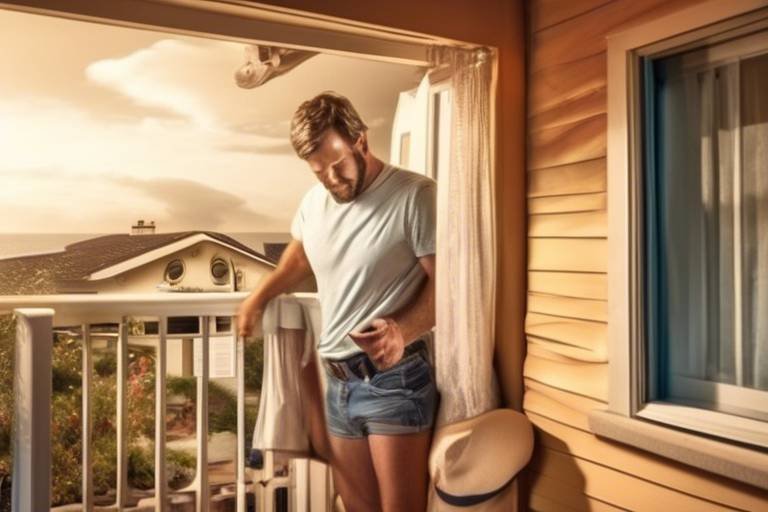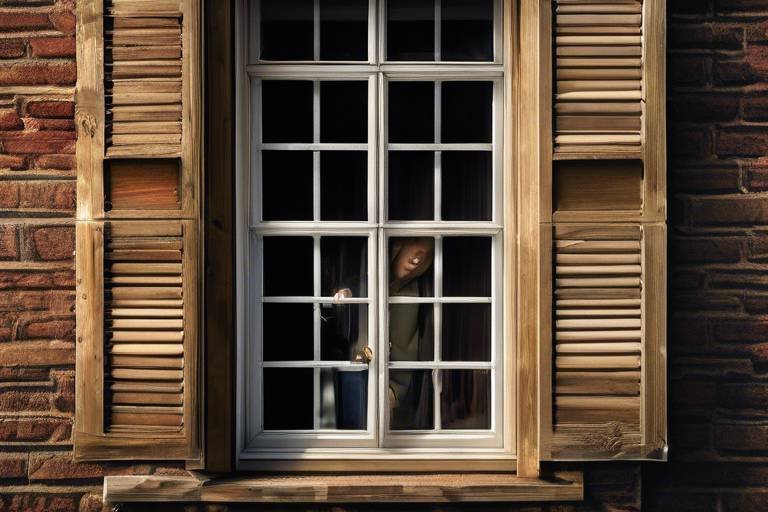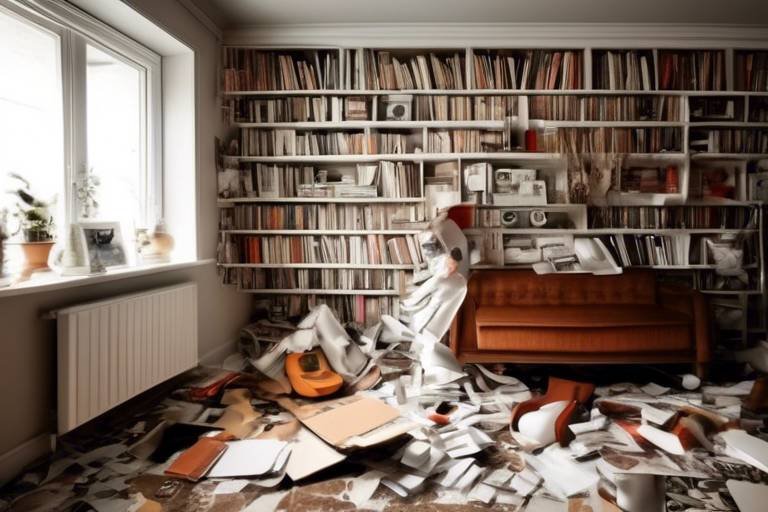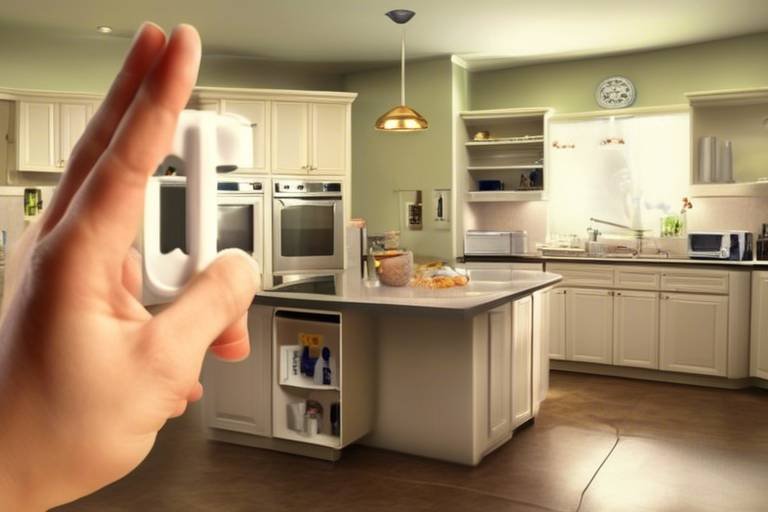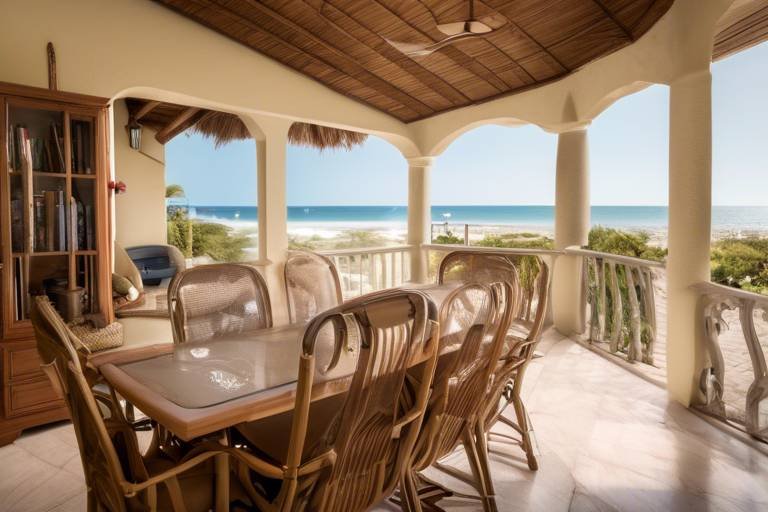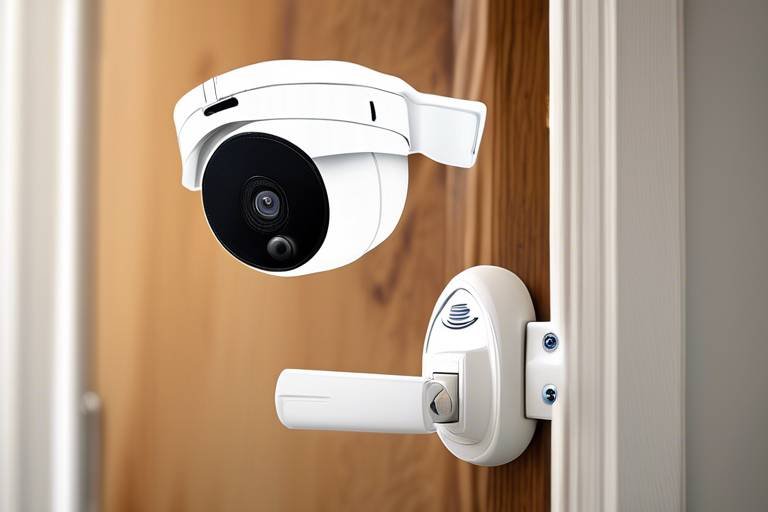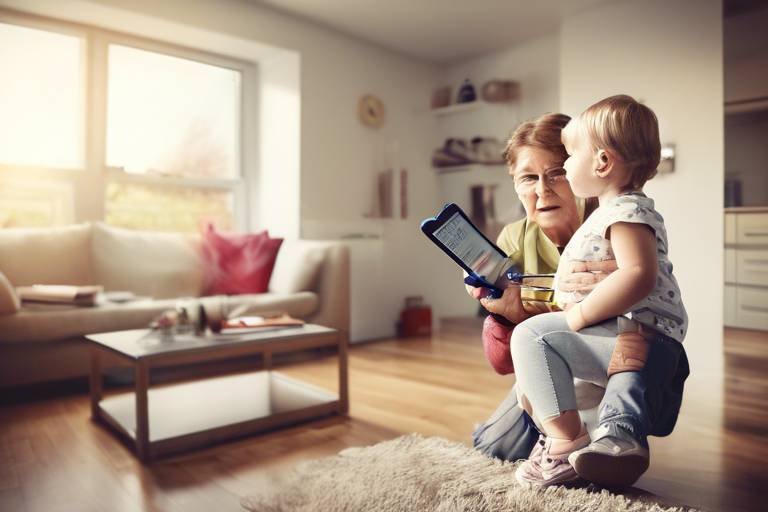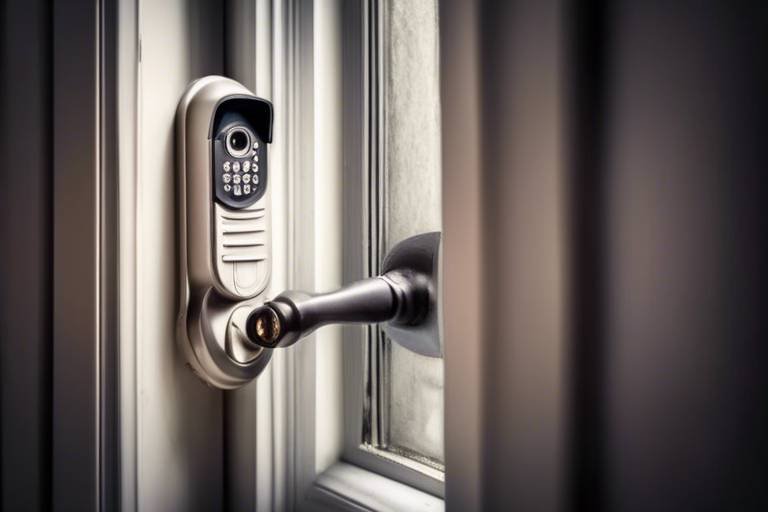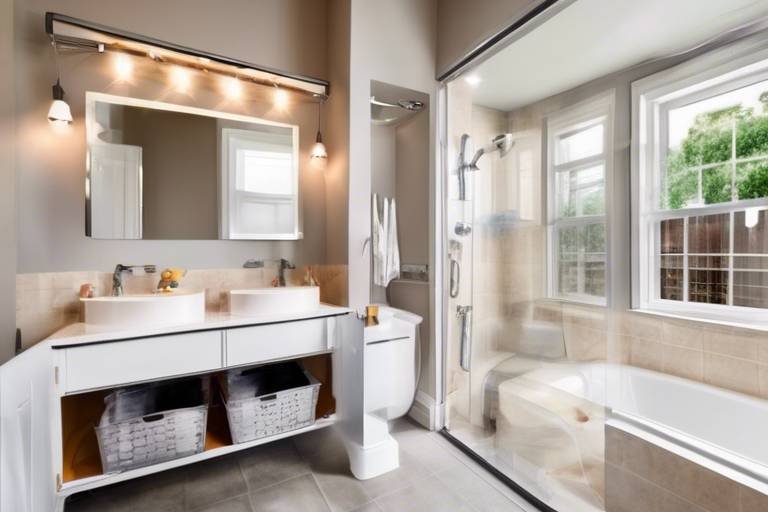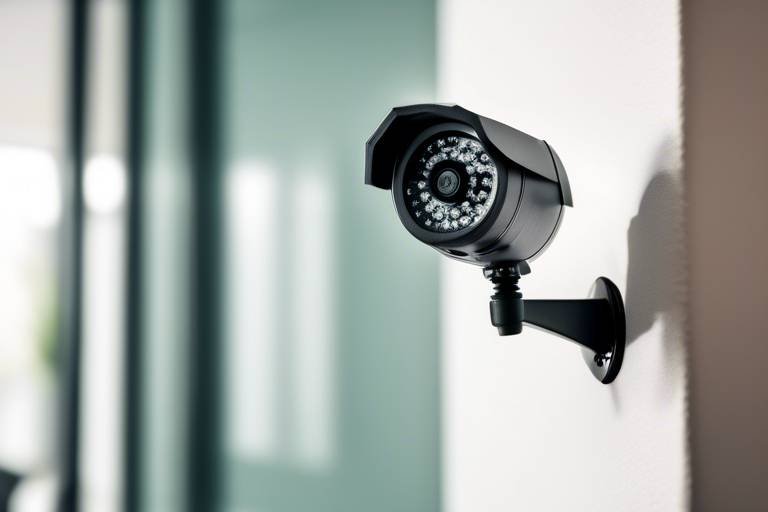Securing Your Home While On Vacation
Ah, vacation time! It’s that blissful period when you can escape the daily grind, explore new places, and create unforgettable memories. But while you're soaking up the sun or hiking through breathtaking landscapes, there's one nagging thought that can ruin your fun: Is your home safe? The last thing you want is to return from a fabulous getaway only to find that your sanctuary has been compromised. So, how do you secure your home while you’re away? In this article, we’ll dive into effective strategies that not only safeguard your home but also grant you the peace of mind you deserve during your travels. From assessing vulnerabilities to leveraging smart home technology and engaging with your community, we've got you covered!
Before you pack your bags, it’s crucial to take a step back and assess your home’s weak points. Think of it as preparing for a big game—you wouldn’t go in without scouting the opponent, right? Start by walking around your property and identifying potential entry points. Are your doors solid and secure? Do your windows have adequate locks? Pay special attention to areas that might be concealed from view, like back doors or basement windows. You can even jot down a vulnerability checklist to ensure you cover all bases:
- Check all doors and windows for proper locks.
- Inspect outdoor lighting—are there any dark spots?
- Look for any landscaping that could provide cover for intruders.
By identifying these vulnerabilities, you can take proactive measures to reinforce your home’s defenses before you head out on your adventure.
In today’s digital age, integrating smart home devices can significantly enhance your home security. Imagine being able to check in on your property from anywhere in the world—sounds like something out of a sci-fi movie, right? But it’s very much a reality today! From smart locks to surveillance cameras, the latest technology options allow you to monitor your home remotely while you’re sipping cocktails on a beach. Let’s explore some of these innovative solutions.
Security cameras are like the watchful eyes of your home. They provide real-time monitoring and can act as a powerful deterrent against potential burglars. When choosing the right cameras, consider factors such as resolution, night vision capabilities, and whether you want indoor or outdoor models. Setting them up for optimal coverage is essential, so let’s break down the best types:
| Camera Type | Best Use |
|---|---|
| Bullet Cameras | Outdoor surveillance |
| Dome Cameras | Indoor surveillance |
| PTZ Cameras | Wide-area monitoring |
Choosing the right camera can make all the difference in protecting your home.
Placement is key! Think of your cameras as the sentinels of your fortress. Ideal locations for installation include:
- Near entry points like doors and windows.
- Overlooking driveways and garages.
- In common areas where valuables are stored.
Properly positioned cameras ensure maximum visibility and protection for your home.
One of the coolest features of modern security cameras is the ability to access live feeds remotely. This means you can keep an eye on your home while enjoying your vacation. Most systems offer mobile apps that send alerts if any unusual activity is detected. It's like having a virtual security guard at your service!
Smart locks offer a blend of convenience and security that traditional locks simply can’t match. Imagine not having to worry about losing your keys or forgetting to lock the door. With keyless entry systems, you can manage access to your home remotely. Whether you want to grant a neighbor access to water your plants or simply check if the door is locked, smart locks provide peace of mind.
Engaging with your community can bolster your home’s security significantly. Think of it as having a safety net—when neighbors look out for each other, everyone benefits. Neighborhood watch programs are an excellent way to create a supportive environment that keeps an eye on homes during vacations. So, how do these programs work?
Strong community ties enhance safety. Get to know your neighbors and foster relationships that can lead to a more vigilant neighborhood. Simple gestures like sharing contact information or organizing block parties can go a long way in building trust and camaraderie.
Being vigilant about unusual behavior can prevent crime. Encourage everyone in your neighborhood to report any suspicious activities to local authorities. It’s like having a neighborhood watch team that’s always on alert! Effective communication is key, so consider setting up a group chat or social media page to keep everyone informed.
Proper preparation can deter potential break-ins. Before you leave, take the time to create a checklist of tasks to complete. This ensures your home remains secure while you enjoy your vacation. Here are some essential steps:
Reinforcing entry points is critical for home security. Ensure all windows and doors are locked and consider adding additional security measures like deadbolts or window bars. These small steps can make a significant difference in minimizing the risk of unauthorized access.
An overflowing mailbox is like a neon sign saying, “I’m not home!” To maintain the appearance of occupancy, arrange for your mail to be held or ask a trusted neighbor to collect it for you. Additionally, pause any regular deliveries to avoid signaling your absence.
Q: How can I make my home look occupied while I'm away?
A: Use timers for lights, ask a neighbor to park in your driveway, and stop mail and deliveries.
Q: What is the best way to monitor my home while on vacation?
A: Install security cameras with remote access features to keep an eye on your property from anywhere.
Q: Are neighborhood watch programs effective?
A: Yes! They foster community vigilance and can significantly deter criminal activity.

Assessing Your Home's Vulnerabilities
When it comes to securing your home, the first step is understanding its vulnerabilities. Think of your home as a fortress; if you don’t know where the weak points are, how can you defend it? Start by walking around your property and inspecting every possible entry point. This includes not only your front and back doors but also windows, garages, and even basement access. Are there any areas that seem less secure? Perhaps a window that doesn’t lock properly or a back door that’s old and worn? Identifying these issues is crucial, as they can serve as invitations to intruders.
Consider the layout of your home as well. Is there an area that’s hidden from the street or neighbors? Thickets of bushes or tall fences can provide cover for someone looking to break in unnoticed. Pay attention to lighting; poorly lit areas around your home can create perfect hiding spots for potential burglars. You might want to jot down your observations, as this will help you prioritize the improvements you need to make.
Here are some common vulnerabilities to look out for:
- Entry Points: Doors and windows should be your first concern. Are they solid and secure?
- Landscaping: Overgrown bushes can obstruct visibility and provide cover.
- Lighting: Ensure all areas are well-lit, especially entry points.
- Neighborhood: Is your neighborhood known for any crime? Knowing this can guide your security measures.
Once you've identified the weak points, it's time to think about solutions. For example, if your front door is flimsy, consider replacing it with a solid wood or metal door. If your windows are outdated, installing window locks or even security film can make a significant difference. Additionally, think about reinforcing your garage door and ensuring that any side gates are locked and secure.
But don't stop there! Engaging with your neighbors can also help bolster your home's security. They can keep an eye on your property while you're away, and you can return the favor when they go on vacation. It's a win-win situation! By assessing your home's vulnerabilities and taking proactive steps to address them, you can enjoy your vacation with peace of mind, knowing that you've done everything possible to protect your home.

Smart Home Technology for Security
In today’s fast-paced world, smart home technology has revolutionized the way we protect our homes. Imagine being able to monitor your property from anywhere in the world, all from the palm of your hand. With advancements in technology, securing your home while you're on vacation has never been easier or more efficient. Smart devices not only enhance your security but also provide peace of mind, allowing you to enjoy your getaway without worrying about what’s happening back home.
One of the most significant benefits of smart home technology is the ability to integrate various devices into a cohesive security system. These devices can communicate with one another, providing real-time updates and alerts directly to your smartphone. For instance, you can receive notifications if a door is opened or if motion is detected in your yard. This interconnectedness creates a robust security network that can deter potential intruders.
Among the most popular smart home devices are security cameras and smart locks. These devices not only provide enhanced security but also offer convenience. Imagine unlocking your front door for a neighbor or a service provider without being physically present. Smart locks allow you to manage access remotely, giving you full control over who enters your home and when. Plus, many of these locks come with features such as temporary access codes, which are perfect for visitors while you’re away.
Security cameras are a cornerstone of any effective home security system. They offer real-time monitoring and can significantly deter burglars. The best types of cameras to consider are those that offer high-definition video, night vision, and two-way audio. This way, you can not only see what’s happening but also communicate if necessary. Setting them up for optimal coverage is crucial; you want to ensure that all entry points and vulnerable areas are monitored.
When it comes to security cameras, placement is everything. Ideal locations for installation include:
- Near entry points, such as doors and windows
- In driveways or garages
- At the back of the house, where intruders may try to enter
- Common areas inside the home for comprehensive coverage
By strategically placing your cameras, you can maximize visibility and ensure that you capture any suspicious activity.
One of the standout features of modern security cameras is remote access. This capability allows homeowners to view live feeds and receive alerts on their smartphones, no matter where they are. Whether you’re lounging on a beach or exploring a new city, you can keep an eye on your home. Many systems also allow you to review recorded footage, giving you the ability to monitor your property even after the fact. Utilizing these features ensures that you’re always connected to your home, providing an extra layer of security.
Smart locks are another fantastic addition to your home security arsenal. They offer convenience and peace of mind, particularly when you’re away. With a smart lock, you can easily lock or unlock your doors from your smartphone, eliminating the need for physical keys. This is especially useful if you need to grant access to someone while you’re on vacation, such as a neighbor or a house sitter. Additionally, many smart locks come with features like activity logs, allowing you to see who accessed your home and when.
In conclusion, integrating smart home technology into your security strategy not only enhances your home’s defenses but also provides you with the convenience of managing your security from anywhere. As you prepare for your next vacation, consider investing in these innovative solutions to ensure your home remains safe and secure in your absence.
Q: Can I install smart security devices myself?
A: Yes, many smart security devices are designed for easy DIY installation. However, if you prefer professional assistance, consider hiring a technician.
Q: How do smart locks work?
A: Smart locks use Wi-Fi or Bluetooth technology to connect to your smartphone, allowing you to lock or unlock your doors remotely.
Q: Are security cameras effective in deterring crime?
A: Yes, visible security cameras can act as a deterrent to potential burglars, as they know they are being monitored.
Q: What should I do if I receive an alert from my security system?
A: If you receive an alert, check the live feed and assess the situation. If you suspect a break-in, contact local authorities immediately.

Installing Security Cameras
When it comes to securing your home, is one of the most effective strategies you can employ. These devices not only provide real-time monitoring but also serve as a significant deterrent to potential burglars. Imagine being able to check in on your home from anywhere in the world, all thanks to a small camera that fits in the palm of your hand! But before you rush out to buy the first camera you see, it’s vital to consider a few key factors that will maximize your security and peace of mind.
First and foremost, you need to choose the right type of camera for your needs. There are several options available, including indoor cameras, outdoor cameras, and doorbell cameras. Each type has its unique features and benefits:
| Camera Type | Best For | Key Features |
|---|---|---|
| Indoor Cameras | Monitoring inside your home | Two-way audio, motion detection |
| Outdoor Cameras | Surveillance of exterior property | Weatherproof, night vision |
| Doorbell Cameras | Viewing visitors at your door | Live video feed, motion alerts |
Once you’ve selected the right camera, the next step is to think about placement. The effectiveness of your cameras largely depends on their location. For outdoor cameras, consider placing them at:
- Entry points such as doors and windows
- Driveways and garages
- Backyards and side entrances
For indoor cameras, focus on common areas like living rooms and hallways where activity is frequent. The key is to ensure that the cameras cover as much ground as possible without being obstructed by furniture or other objects.
Another significant advantage of modern security cameras is their remote access features. Many cameras now come equipped with mobile apps that allow you to view live feeds, receive alerts, and even communicate through the camera. This means you can keep an eye on your home while you’re lounging on the beach or exploring a new city. Just imagine getting an alert about movement in your backyard while sipping a cocktail—talk about peace of mind!
As you embark on your journey to secure your home with cameras, remember to consider the privacy aspects as well. Make sure to inform your family and friends about the cameras and ensure they are positioned in a way that respects the privacy of others. After all, the goal is to protect your home, not to invade the privacy of your guests or neighbors.
In conclusion, installing security cameras is a smart move that can significantly enhance your home security. By choosing the right type of camera, placing them strategically, and utilizing their remote features, you can keep a watchful eye on your property, ensuring a worry-free vacation. So, are you ready to take that leap and invest in your peace of mind?
Q: How many cameras do I need for my home?
A: The number of cameras depends on the size of your home and the areas you want to monitor. A good starting point is one camera for each entry point and a few additional ones for high-traffic areas.
Q: Can I install security cameras myself?
A: Yes, many security cameras are designed for easy DIY installation. However, if you prefer professional assistance, hiring an expert can ensure optimal placement and setup.
Q: Do security cameras work at night?
A: Most modern security cameras come equipped with night vision capabilities, allowing them to capture clear footage even in low-light conditions.

Choosing the Right Location
When it comes to securing your home with cameras, the placement is everything. Think of your security cameras as the eyes of your home; they need to be positioned strategically to provide the best coverage. First and foremost, consider the entry points. Front doors, back doors, and ground-level windows are prime spots for potential intruders. By placing cameras at these locations, you can capture any suspicious activity before it escalates.
Additionally, consider the field of view each camera offers. Ideally, you want to install cameras that have a wide-angle lens to cover as much area as possible. This way, you can monitor several entry points with fewer devices. For example, if your front porch is visible from the street, a camera with a 180-degree view can help you keep an eye on visitors and deliveries without needing a separate camera for each side.
Another important factor is lighting. Cameras placed in well-lit areas are more effective, as they can capture clearer images. If your property has dark spots, consider installing motion-activated lights to illuminate these areas at night. Not only does this improve visibility, but it also acts as a deterrent for would-be intruders who prefer to operate in the shadows.
Moreover, think about the height and angle of your cameras. Installing them too high might make it difficult to capture facial features, while placing them too low could make them easy targets for vandalism. A good rule of thumb is to mount cameras at a height of about 8 to 10 feet, angled downwards to capture the faces of anyone approaching your home. This positioning not only provides better footage but also keeps the cameras out of easy reach.
Lastly, don’t forget about the backyard. Many homeowners overlook this area, but it’s just as vulnerable as the front. If you have a garage or shed, ensure there’s a camera monitoring those spaces as well. A comprehensive security system considers every angle of your property, making it less appealing to intruders.
To summarize, here are a few key points to remember when choosing the right location for your security cameras:
- Focus on entry points: front and back doors, and accessible windows.
- Utilize wide-angle cameras for broader coverage.
- Ensure adequate lighting for clear footage.
- Mount cameras at a height of 8 to 10 feet, angled downwards.
- Don’t neglect the backyard and other vulnerable areas.

Remote Access Features
Imagine being on a sun-soaked beach, sipping a cool drink, and knowing that you can check in on your home anytime, anywhere. That’s the magic of remote access features in smart home security systems. These capabilities allow you to monitor your home in real-time, providing an extra layer of reassurance while you’re away. With just a few taps on your smartphone, you can view live camera feeds, receive alerts about unusual activity, and even interact with visitors at your door. Isn’t technology amazing?
Most modern security cameras come equipped with mobile apps that enable you to access live feeds directly from your device. This means you can keep an eye on your property whether you're lounging by the pool or exploring a new city. The convenience of remote access allows you to stay connected to your home, giving you peace of mind that everything is as it should be.
Additionally, remote access features often include notifications and alerts. For example, if a motion sensor detects movement in your yard, you’ll get an instant notification on your phone. This immediacy can be crucial—imagine receiving an alert and being able to check the camera feed to see if it’s just a passing animal or something more concerning. You can also set up alerts for specific times, ensuring you’re notified only when it matters most.
Another fantastic aspect of remote access is two-way communication. Many smart doorbells and cameras come with built-in microphones and speakers, allowing you to speak to visitors or delivery personnel even when you’re miles away. This feature not only enhances security but also adds convenience—no more missed package deliveries because you weren’t home!
To get the most out of these features, consider the following:
- Choose devices with robust mobile applications: The app should be user-friendly and offer all the necessary features for monitoring and alerts.
- Ensure compatibility: Make sure your smart devices can integrate smoothly with your existing home automation systems.
- Regularly update your software: Keeping your app and devices updated ensures you have the latest security patches and features.
In conclusion, remote access features in smart home security systems not only provide you with the ability to monitor your home but also empower you to take action if something seems off. With the right setup, you can enjoy your vacation to the fullest, knowing that you have a virtual eye on your property.
Q: Can I access my security cameras from multiple devices?
A: Yes! Most security camera systems allow you to log in from multiple devices, so you can check in from your phone, tablet, or computer.
Q: What should I do if I receive an alert while I'm away?
A: If you receive an alert, check the live feed to assess the situation. If you see something suspicious, you can contact local authorities or a trusted neighbor for assistance.
Q: Are remote access features secure?
A: While no system is entirely foolproof, most smart home devices use encryption and other security measures to protect your data. Always ensure your devices are updated and use strong passwords.
Q: Can I control my smart locks remotely?
A: Absolutely! Many smart locks come with remote access features, allowing you to lock or unlock your door from anywhere, making it easy to grant access to guests or service personnel.

Utilizing Smart Locks
In today's fast-paced world, smart locks are revolutionizing the way we think about home security. Imagine being able to lock and unlock your doors from anywhere in the world, all while sipping a piña colada on a sunny beach. Sounds like a dream, right? Well, with smart locks, that dream can become a reality! These innovative devices not only offer convenience but also add an extra layer of security to your home while you're away on vacation.
One of the most significant advantages of smart locks is their keyless entry system. Gone are the days of fumbling for your keys or worrying about lost duplicates. With smart locks, you can grant access to family members or trusted friends via a mobile app, making it easy for them to check on your home while you're away. You can even set temporary access codes that expire after a certain period, ensuring that no one can enter your home once you return.
But how do you choose the right smart lock for your needs? The market is flooded with options, so it’s essential to consider a few key factors:
- Compatibility: Ensure that the smart lock you choose is compatible with your existing door hardware.
- Connectivity: Look for locks that connect via Wi-Fi or Bluetooth, allowing for remote access.
- Security Features: Opt for locks with advanced security features, such as two-factor authentication and tamper alerts.
Once you've selected the perfect smart lock, installation is typically straightforward. Many models come with detailed instructions, and you can often find helpful video tutorials online. However, if you're not comfortable with DIY projects, hiring a professional can ensure everything is set up correctly.
After installation, it’s time to explore the remote management features. Most smart locks come with a mobile app that allows you to monitor who enters and exits your home. You can receive real-time notifications whenever someone uses the lock, giving you peace of mind while you're away. Plus, if you ever forget to lock the door, you can do it right from your smartphone, eliminating the anxiety of leaving your home unsecured.
In summary, utilizing smart locks is an effective way to enhance your home security while you enjoy your vacation. They offer convenience, peace of mind, and a modern solution to traditional locking mechanisms. So, before you pack your bags and head out on your next adventure, consider installing a smart lock to keep your home safe and sound!
1. Can I install a smart lock myself?
Most smart locks are designed for easy installation and come with comprehensive instructions. However, if you're unsure, hiring a professional can ensure a proper setup.
2. Will a smart lock work during a power outage?
Many smart locks have battery backups, so they will continue to function even during a power outage. Always check the specifications of the model you choose.
3. Can I use a smart lock with my existing deadbolt?
Yes, many smart locks can be installed over existing deadbolts, allowing you to maintain your current security while adding smart features.
4. How do I grant access to guests?
Most smart locks allow you to create temporary access codes through their mobile app, which can be shared with guests for a specific duration.

Neighborhood Watch Programs
Engaging with your community can significantly bolster your home security, and one of the most effective ways to do this is through . These initiatives encourage residents to come together to keep an eye on each other’s properties, fostering a sense of community and vigilance that can deter criminal activity. Imagine living in a neighborhood where everyone looks out for one another—sounds comforting, right? That's the essence of a Neighborhood Watch!
These programs typically involve residents volunteering to monitor their surroundings and report any suspicious behavior to local law enforcement. They can create a powerful network of eyes and ears, making it much harder for potential burglars to operate unnoticed. In fact, many studies have shown that neighborhoods with active watch programs experience lower crime rates. But how do these programs actually work? Let’s break it down:
- Regular Meetings: Neighborhood Watch groups often hold regular meetings to discuss safety concerns, share updates, and plan community events.
- Information Sharing: Members share information about local crime trends, suspicious activities, and safety tips, creating a well-informed community.
- Collaboration with Police: These programs maintain a close relationship with local law enforcement, which can provide valuable resources and support.
Building community relationships is crucial to the success of a Neighborhood Watch program. When neighbors know each other, they are more likely to communicate, share information, and look out for one another. This sense of camaraderie not only enhances safety but also fosters a friendly environment where everyone feels connected. To strengthen these ties, consider organizing community events like block parties or potlucks. These gatherings provide a relaxed atmosphere for neighbors to bond and establish trust.
Another key aspect of Neighborhood Watch programs is the importance of reporting suspicious activity. If you notice something out of the ordinary—like a stranger loitering around your neighbor's house or a vehicle that seems out of place—it's essential to report it. Local authorities often rely on community members to help identify potential threats. When reporting suspicious activities, be sure to provide as much detail as possible, including descriptions of individuals, vehicles, and the nature of the suspicious behavior.
In summary, Neighborhood Watch programs are a proactive approach to enhancing home security through community involvement. By fostering strong relationships with your neighbors and staying vigilant, you can create a safer environment for everyone. Remember, a united community is a strong community, and together, you can significantly reduce the risk of crime in your area.
Q: How do I start a Neighborhood Watch program in my area?
A: To start a Neighborhood Watch program, gather interested neighbors and contact your local law enforcement agency for support. They can provide resources, training, and guidance to help you establish the program effectively.
Q: What should I do if I see suspicious activity?
A: If you observe suspicious behavior, document the details and report it to local authorities immediately. Avoid confronting the individuals directly, as this could be dangerous.
Q: Are Neighborhood Watch programs effective?
A: Yes, numerous studies have shown that Neighborhood Watch programs can reduce crime rates and enhance community safety by fostering a culture of vigilance and cooperation among residents.

Building Community Relationships
When it comes to securing your home, the old saying holds true: "It takes a village." Building strong community relationships is like creating a safety net for your home. Imagine your neighborhood as a well-oiled machine, where everyone looks out for one another. When you foster these connections, you not only enhance your own security but also contribute to the overall safety of your community.
Start by introducing yourself to your neighbors. A simple wave or a friendly chat can go a long way. You might be surprised at how many people are willing to share their contact information or establish a communication channel. Consider organizing a small gathering, such as a barbecue or coffee morning, where neighbors can mingle and get to know each other better. This can create a sense of camaraderie that makes everyone feel more invested in the neighborhood's safety.
Furthermore, participating in community events can strengthen these bonds. Whether it's a local festival, a clean-up day, or a neighborhood watch meeting, being active in your community is essential. Not only does this help you build relationships, but it also increases your visibility and awareness of any unusual activities in the area. If everyone is engaged, suspicious behavior is more likely to be noticed and reported.
Here are some tips to foster community relationships:
- Join or start a neighborhood watch program.
- Share contact information with neighbors for emergencies.
- Organize regular meet-ups to discuss community concerns.
- Utilize social media groups to stay connected and informed.
Ultimately, the goal is to create a supportive environment where everyone feels responsible for each other's safety. When neighbors are connected, they are more likely to look out for one another, especially when someone is away on vacation. It’s like having a team of security guards who know your routine and can spot anything out of the ordinary. So, take the initiative to build these relationships; your home security will thank you for it!
Q: How can I start building relationships with my neighbors?
A: Start with simple greetings and small conversations. Consider hosting a casual get-together to foster a sense of community.
Q: What if my neighbors are not responsive?
A: Don't be discouraged! Keep trying to engage with them. You can also join community events or groups to meet new people.
Q: How can community relationships help in home security?
A: A connected community is more vigilant. Neighbors who know each other are more likely to notice suspicious activities and report them promptly.

Reporting Suspicious Activity
When it comes to home security, being aware of your surroundings is just as important as installing the latest gadgets. Reporting suspicious activity is a crucial part of keeping your neighborhood safe and your home secure. Have you ever noticed someone lurking around your block, or perhaps a car that seems out of place? These little details can make a big difference in preventing crime. By being vigilant and proactive, we can create a community that watches out for one another.
First and foremost, it's essential to understand what constitutes suspicious activity. This can include a variety of behaviors such as:
- Unfamiliar individuals loitering near homes or vehicles.
- Someone trying to open doors or windows that don't belong to them.
- Vehicles parked for an extended period without a clear reason.
- Strange noises at odd hours, like breaking glass or loud shouting.
If you observe any of these behaviors, don't hesitate to take action. Start by documenting the details. Write down descriptions of the individuals involved, the time and location of the incident, and any other relevant information. This will help local authorities respond more effectively. Remember, you don’t need to be a detective; just being observant can go a long way.
Next, communicate with your neighbors. Sharing information can strengthen community ties and enhance safety. If you notice something unusual, let them know. They might have seen something similar or have additional insights that could be helpful. Consider setting up a group chat or a neighborhood app where residents can easily share updates about suspicious activities.
When it comes to reporting, don’t hesitate to contact local law enforcement. Most police departments have non-emergency numbers for reporting suspicious activity. If you feel that a situation is dangerous or escalating, always call 911. Your safety is the top priority. It's better to be safe than sorry, and your report could prevent a crime from happening.
Finally, remember that while it's essential to be vigilant, it's equally important not to jump to conclusions. Misunderstandings can happen, and not every unusual sight is a sign of trouble. However, trusting your instincts is key. If something feels off, it probably is. By fostering a culture of awareness and communication, we can all contribute to a safer environment, making it harder for potential criminals to operate.
Q: What should I do if I see someone suspicious?
A: Document the details and report it to local authorities. If it seems urgent, call 911.
Q: How can I communicate effectively with my neighbors about security?
A: Consider starting a group chat or using community apps to share information quickly and efficiently.
Q: Is it necessary to report every suspicious activity?
A: While not every unusual sighting requires a report, trust your instincts. If something feels off, it's worth mentioning.
Q: What are the signs of a potential break-in?
A: Signs can include unfamiliar individuals loitering, attempts to open doors or windows, or vehicles parked without reason.

Preparing Your Home Before Leaving
Before you embark on your much-anticipated vacation, it's essential to ensure your home is as secure as possible. Think of your house as a fortress; if you leave the gates wide open, you might be inviting trouble. Preparing your home involves a series of strategic steps that not only protect your belongings but also provide you with peace of mind while you’re away. This preparation can significantly reduce the likelihood of a break-in and ensure that you can enjoy your holiday without worrying about what’s happening back home.
First off, start by securing all entry points. Doors and windows are the most common access points for intruders. Reinforce these areas by installing deadbolts on doors and using window locks. If you have sliding doors, consider using a rod or a dowel in the track to prevent them from being forced open. Additionally, you might want to invest in some security film for your windows, making them harder to shatter. Every little bit helps, and these measures can serve as a deterrent to would-be burglars.
Next, think about your mailbox and deliveries. An overflowing mailbox is a glaring sign that no one is home. To mitigate this, you have a couple of options. You can put a hold on your mail through the postal service or ask a trusted neighbor to collect it for you. This simple act can keep your home looking occupied. Similarly, if you receive regular packages, consider pausing deliveries or asking a neighbor to pick them up. It's all about maintaining the illusion that someone is home.
Another crucial aspect of preparing your home is to ensure that your landscaping doesn’t give away your absence. Trim any overgrown bushes or trees that could obscure the view of your home or provide cover for intruders. A well-kept yard signals that someone is home and attentive. If you're going to be away for an extended period, consider hiring a service to maintain your lawn and garden. This not only keeps your property looking great but also adds an extra layer of security.
Lastly, don't forget to inform your neighbors about your vacation plans. This can be a great way to establish a supportive network. Ask them to keep an eye on your property and report any suspicious activities. You could even offer to do the same for them when they go on vacation. Building these relationships can create a sense of community and safety, making everyone feel more secure.
In summary, preparing your home before leaving for vacation is not just about locking doors and turning off lights. It's about creating a secure environment that deters potential threats. By reinforcing entry points, managing your mail, maintaining your landscaping, and fostering community relationships, you can enjoy your getaway with confidence. Remember, a little preparation goes a long way in safeguarding your sanctuary.
- What are the best ways to secure my windows?
Consider using window locks, security film, and reinforcing with wooden dowels for sliding windows.
- How can I maintain the appearance of occupancy?
Ask a neighbor to collect your mail, trim your lawn, and even park a car in your driveway if possible.
- Should I inform my neighbors about my vacation?
Yes! Informing them can help create a watchful community that looks out for each other.
- Is it necessary to hire a service to maintain my yard?
While not necessary, it can be beneficial to keep your property looking lived-in and deter potential intruders.

Securing Windows and Doors
When it comes to securing your home, windows and doors are the primary entry points for intruders. Think of them as the gateways to your sanctuary; if they’re not properly fortified, you’re essentially rolling out the welcome mat for potential thieves. So, what can you do to ensure these access points are as secure as possible? First, it’s essential to assess the current state of your windows and doors. Are they sturdy? Do they have reliable locks? Are there any gaps that could be exploited? Addressing these questions will set the foundation for a robust security plan.
One effective method to enhance the security of your doors is to install deadbolt locks. Unlike standard locks that can be easily picked, deadbolts provide an additional layer of protection, making it significantly harder for intruders to gain access. Furthermore, consider upgrading your door frames. A solid frame can withstand force better than a flimsy one, so investing in reinforced frames can pay off in the long run. Additionally, if you have sliding doors, adding a security bar can prevent them from being forced open.
Now, let’s talk about windows. Many homeowners overlook them, but they can be just as vulnerable as doors. To secure your windows, start by installing window locks if they don’t already have them. Beyond locks, you can also use window film, which can make glass more difficult to break. If you’re feeling particularly proactive, consider installing security screens or grilles that allow you to enjoy fresh air without compromising safety. Remember, a well-secured window is like a well-guarded treasure chest; it keeps your valuables safe while you’re away.
Another tip is to use motion-sensor lights around your home, particularly near windows and doors. These lights can act as a deterrent for burglars, who prefer to operate in the shadows. When they see a light flick on unexpectedly, they might think twice about their intentions. In addition, maintaining a well-lit exterior not only enhances security but also improves the overall curb appeal of your home.
Finally, it’s crucial to keep your surroundings tidy. Overgrown bushes or trees can provide cover for potential intruders. Trim any landscaping that could obscure visibility and consider installing outdoor cameras that can monitor these areas. Remember, a well-maintained yard sends a message that you care about your home, making it less appealing to those with nefarious intentions.
In summary, securing your windows and doors is a multifaceted approach that involves assessing vulnerabilities, upgrading locks, reinforcing frames, and maintaining a well-lit and tidy exterior. By taking these steps, you can significantly enhance the security of your home, ensuring that you can enjoy your vacation with peace of mind.
- What is the best type of lock for my front door?
Deadbolt locks are generally considered the most secure option for front doors, providing an extra layer of protection compared to standard locks. - How can I secure my windows?
Installing window locks, using window film, and adding security screens can greatly enhance window security. - Do motion-sensor lights really deter burglars?
Yes, motion-sensor lights can deter potential intruders by illuminating areas around your home unexpectedly. - Should I trim my bushes and trees?
Yes, keeping your landscaping tidy improves visibility around your home and makes it less appealing for burglars to hide.

Stopping Mail and Deliveries
When you're gearing up for a vacation, one of the most crucial steps in ensuring your home remains secure is to manage your mail and deliveries effectively. An overflowing mailbox is like a neon sign blinking "empty house" to potential burglars. So, how do you keep your home looking occupied while you’re away? It’s easier than you think!
First off, consider putting a hold on your mail. The United States Postal Service (USPS) provides a convenient service that allows you to request a temporary hold on your mail delivery. This way, all your mail will be safely stored at the post office until you return. To make this process even simpler, you can complete the request online or visit your local post office. Here’s a quick breakdown of how it works:
| Step | Description |
|---|---|
| 1 | Visit the USPS website or your local post office. |
| 2 | Fill out the hold request form. |
| 3 | Choose the start and end dates for your mail hold. |
| 4 | Confirm your request and enjoy your vacation! |
In addition to stopping your mail, think about your packages too. If you’re expecting deliveries while you’re away, you might want to consider using package delivery services that offer secure drop-off options. Some companies provide lockers or designated areas where packages can be safely stored until you return. This not only prevents packages from piling up but also gives you peace of mind knowing your items are secure.
Another handy tip is to ask a trusted neighbor or friend to keep an eye on your home. They can collect any mail or packages that might arrive during your absence. This not only helps maintain the illusion that someone is home but also fosters a sense of community. Plus, it’s a great opportunity to return the favor when they go on vacation!
Lastly, don’t forget to adjust your delivery settings for any subscriptions you may have, like newspapers or meal kits. Temporarily pausing these services not only prevents unnecessary deliveries but also saves you money. After all, who wants to come back to a pile of expired meal kits or newspapers stacked up at the door?
By taking these proactive steps to manage your mail and deliveries, you can significantly enhance the security of your home while you’re off creating unforgettable memories on your vacation. Remember, a little preparation goes a long way in keeping your home safe!
- What should I do if I receive mail while on vacation?
Consider putting a hold on your mail through the USPS or asking a trusted neighbor to collect it for you. - How can I prevent package theft while I'm away?
Use secure delivery options or ask a neighbor to pick up packages for you. - Is it safe to leave my mail unattended?
Leaving mail unattended can signal to potential burglars that your home is empty, so it's best to manage it before you leave.
Frequently Asked Questions
- How can I assess my home's vulnerabilities before going on vacation?
Start by walking around your property and identifying potential weak points, such as unlocked doors, windows that are easy to access, or poorly lit areas. Consider conducting a security audit to pinpoint spots that might need extra attention, like adding deadbolts or motion-sensor lights.
- What smart home devices should I consider for security?
Some of the best smart home devices include smart locks, security cameras, and motion detectors. These devices can be monitored remotely, allowing you to keep an eye on your home from anywhere, ensuring you feel secure while you enjoy your vacation.
- Where should I install security cameras for optimal coverage?
Install cameras at entry points like front and back doors, as well as in areas with high traffic, such as driveways or garages. Make sure to place them at a height that captures clear images but is also out of reach to prevent tampering.
- Can I access my security cameras remotely?
Yes! Many modern security cameras come with remote access features that let you view live feeds and receive alerts directly on your smartphone. This capability is invaluable for keeping tabs on your home while you’re away.
- What are the benefits of using smart locks?
Smart locks provide keyless entry, allowing you to lock and unlock your doors remotely. You can grant access to trusted friends or family without needing to hand over a physical key, making it a convenient option for homeowners.
- How do neighborhood watch programs enhance home security?
Neighborhood watch programs foster community cooperation. By working together, neighbors can keep an eye on each other's properties and report suspicious activities, creating a safer environment for everyone.
- What should I do if I notice suspicious activity in my neighborhood?
If you see something unusual, don't hesitate to report it to local authorities. Communicating with your neighbors about any concerns can also help maintain a vigilant community that looks out for one another.
- What preparations should I make at home before leaving for vacation?
Before you leave, secure all windows and doors, stop mail and deliveries, and set timers for lights to create the illusion that someone is home. This preparation can help deter potential break-ins while you're away.
- How can I secure my windows and doors effectively?
Consider reinforcing entry points by installing deadbolts, window locks, and security bars. Also, using window film can make it harder for intruders to break glass, adding an extra layer of protection.
- What should I do with my mail and deliveries while on vacation?
To prevent signaling that your home is empty, you can request a hold on your mail through your postal service or ask a trusted neighbor to collect it for you. This simple step can help maintain the appearance of occupancy.

